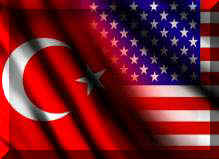
A series of expert working papers released today by the Atlantic Council call for Turkey and the United States to give greater priority to working in a trilateral format with Europe on energy security, counter-terrorism, and building regional stability in the broader Middle East. The United States and Turkey have drifted apart since the end of the Cold War, but together this partnership should refocus its attention on addressing the key challenges of the 21st century, according to a group of U.S., Turkish, and European experts.
The January 8 meeting between Presidents Abdullah Gül and George Bush reflected a recent improvement in relations, due to enhanced U.S. assistance to Turkish efforts to fight PKK terrorism. But if that meeting is to have a lasting impact and strengthen the U.S.-Turkey partnership — and not fade away as did the 2006 Strategic Vision — more concrete steps must be taken to overcome the past few years of tension and recrimination.
The U.S.-Turkey partnership must also reflect Turkey’s changing relations with the European Union. The United States should support Turkey’s bid to join the EU, while encouraging Turkey to undertake the needed reforms. But Washington should also include Turkey in some elements of U.S.-EU cooperation on energy security, counter-terrorism, and the wider Middle East.
The authors of the papers include O. Faruk Logoglu, former Turkish ambassador to the United States; W. Robert Pearson, former U.S. ambassador to Turkey; Michael Lake, former European Commission ambassador to Turkey; Sinan Ülgen, chairman of EDAM; Gökhan Çetinsaya, chairman of SETA; Ian O. Lesser of the German Marshall Fund of the United States; and Stephen Larrabee of RAND.
Together, the papers recommend:
- The United States and Turkey should work together to address the issue of PKK bases in northern Iraq, building on recent enhanced cooperation, but the Turkish government should also begin a process of reconciliation with the Kurdish community;
- To broaden support for both U.S.-Turkey and EU-Turkey relations, the ties between civil societies must be strengthened;
- The U.S.-Turkey economic relationship should be encouraged to grow, so that a stronger bilateral business community can provide stability for the overall relationship;
- The U.S. and the EU should put new energy into resolving the Cyprus issue;
- The United States should encourage a more active regional role for Turkey, including fostering stronger NATO partnerships with its neighbors; and
- The United States should expand its new emphasis on Turkey as an energy partner to include Turkey in more transatlantic efforts to fight global terrorism and to build stability in the broader Middle East.
The working papers, which are co-sponsored by the Strategic Studies Institute of the U.S. Army War College, are the result of a workshop sponsored by the Army War College/SSI, the German Marshall Fund of the United States, the Heinrich Boell Foundation, and the European Commission. Copies are available on the Atlantic Council’s website or by contacting Fran Burwell at fburwell@acus.org or (202) 778-4970.
Working Papers:
- Rebuilding U.S.-Turkey Relations in a Transatlantic Context – Fran Burwell, Atlantic Council of the United States
- The State of U.S.-Turkey Relations: A Turkish Perspective – O. Faruk Logoglu, former Turkish ambassador to the United States
- Turkey and NATO: New Images and Old Questions – W. Robert Pearson, former U.S. ambassador to Turkey
- Turkey: Tilting from U.S. to EU? – Michael Lake, former European Commission ambassador to Turkey
- The Evolving EU, NATO and Turkey Relationship: Implications for Transatlantic Security – Sinan Ülgen, chairman of EDAM
- The New Middle East, Turkey and the Search for Regional Stability – Gökhan Çetinsaya, chairman of SETA
- The State of U.S.-Turkish Relations: Moving Beyond Geopolitics – Ian O. Lesser, German Marshall Fund of the United States
- Turkey’s New Middle East Activism – F. Stephen Larrabee, RAND Corporation
Image: usa-turkey.jpg
